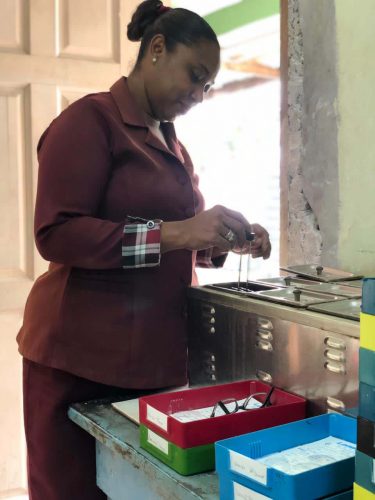An optical technician is the person who shapes and fits the lens into the frame of glasses. It is a mostly male-dominated field in this country, but Racquel Gonsalves has been doing it for 12 years now.
Currently an optical technician at Lens Craft Optical, she began her career as a sales clerk at Da Silva House of Optics. Every time a customer took spectacles to be fixed, she would watch as the optical technician worked on them and her interest in this area grew. After a period of time, she took a similar position at Value Eye Wear Optical. There, her curiosity got the better of her and she started paying special attention to the detail in fixing glasses.

Gonsalves said the optical technicians never cared to share what they were doing with her, probably for fear of competition. However, by the time she left Value Eye Wear Optical, she was sure she knew most of what it took to be an optical technician, so when Lens Craft had an opening for that position, she applied. During the interview, she was asked to exhibit her skills and while she did not know it all, she knew enough to be hired.
As a novice, she sometimes messed up, but she always managed to figure out how to get it right. She realized that people were harder on her than they would have been on a man, particularly because many still think that she does not belong in the field. It was no easy feat but she was determined to try her best and there were some men who praised her for getting into this career.
She shared that many days she took her work home with her, not the physical work, but the thoughts of it. She would be doing the dishes or another chore while contemplating the day’s challenge and deciding how she ought to have addressed it. Today, she has come a long way from that and hardly finds new challenges; she has become an expert.
Gonsalves described how she uses the lensometer, “to verify the correct prescription in a pair of glasses, to properly orient and mark uncut lenses, and to confirm the correct mounting of lenses in spectacle frames.
“I would look through the lensometer to see what’s written on the prescription of the doctor. If it corresponds, and once it’s correct, I have a machine that will take the shape of the frame that the person selects and the machine will cut that lens to suit that frame. After that the lenses will go over to the [lens edging machine] that will bevel the lens to fit into the frame. When that is finished we have another machine that has a variety of coloured tint. Some of the lenses are transition lenses or photochromic lenses. These are expensive lenses and not many persons can afford this kind so they would [opt] for the cheaper lens which would be the plastic lens that does not change with the sunlight. The machine would put the tint on the glasses to prevent direct sunlight…”
Some of the lenses she has worked with are the bifocals that have lines to allow for two prescriptions and two distances. Today, however, more people are opting for no-line progressive lenses, which enable wearers to see near-, medium- and far distances.
Gonsalves said some of the lenses are really hard materials and cannot be cut by the machine she uses. These are done manually by a male colleague.
Gonsalves finds great satisfaction in her work. Sometimes she would be out and about and see someone wearing spectacles she cut and fitted as she said there is a distinct feature in the way she does her work. The beautiful way it fits on their faces brings an inner joy.
“I did a frame transfer one time, which is when you want to use the same lens but in another frame. I had an older woman who came from abroad. She came and she said she went to different opticals in the country and they told her it can’t be done. I told her she can sit and wait and I went and I did it. At first she didn’t know it was me who fitted the lens in the new frame but when I went back outside and said, ‘Here [are] your glasses’, she was like, ‘You did this’, and I said ‘Yes’. She stood up and shook my hands in front of everybody and said she was proud to know that a woman could actually do that. That was a motivation for me to keep going,” reminisced Gonsalves.
With Lens Craft Optical being one of the leading optical care companies in Guyana, particularly because it has frames and lenses that are not available elsewhere, Gonsalves has her work cut out for her. She pointed out that on the first Friday of every month, the company offers their glasses at a cheaper cost. This offer attracts a lot of customers and as a result, her workload becomes really hectic.
Gonsalves said she is not done learning yet and wants to someday learn how to put the prescription into the glasses. The lenses come blank without the prescription but employees in the lab do calculations based on what is prescribed by the doctor and add this using a different machine. At the moment, Gonsalves has her hands full as she is also a single mother of three children, so time and finance do not allow for this yet, but whenever that opportunity arises, she intends to snatch it up.
Having trod this path, she encourages women to go after what they want and not be hindered by society’s stereotyping of whether certain jobs are designed for only a particular gender. Gonsalves admonished, “You will have persons that will criticize you and make you feel as though you are not doing a good job or belong there, but if that’s your dream, your goal, push through. Don’t let anybody stand in your way.”






